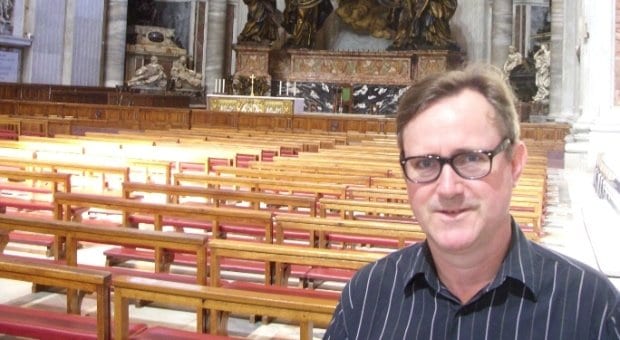The central idol of the Catholic Church is a naked man in a BDSM pose, so is it any surprise the clergy’s gone gay?
In Daniel Gawthrop’s The Trial of Pope Benedict: Joseph Ratzinger and the Vatican’s Assault on Reason, Compassion, and Human Dignity, the author describes what he sees as the two types of gay men who join the church: the Catholics who look to the establishment as a state of grace to protect them from their sexual truth while they hide behind vows of celibacy, and the much rarer “more confident soul who enters the seminary in good faith and makes no attempt to hide himself or even his sexuality,” Gawthrop writes.
It certainly seems as if some church officials aren’t bothering to hide anything — at least not very well.
Some critics refer to Cardinal Tarcisio Bertone’s 2008 apartment-block purchase above Italy’s biggest gay bathhouse (for a cool $30 million of your granny’s Sunday mass donations) as “the biggest gay club in the world.” The bathhouse shrewdly markets itself with men dressed as priests getting it on with sweaty bears. Know thy neighbours.
With new gay reports surfacing in the media constantly, it’s difficult to deny that homosexuality — a “threat to the future of humanity,” as Benedict XVI warned — has infiltrated the church. Maybe Benedict confused “humanity” with the Vatican.
“That’s what did it in for him; that’s why he quit,” Gawthrop alleges.
“Imagine someone like him who has basically made it his mission to clean the Vatican of ‘its Filth’ — meaning [gay people] — to suddenly be confronted with these three big dossiers compiled by cardinals coming back to him with reports saying, ‘I’m sorry, your Holiness, but tons of Vatican officials are being blackmailed by, you know, hustlers, and oh yes, there’s a big bathhouse, and oh yes, Bertone approved it.’
“You can just imagine him tearing his hair out and saying, ‘I’m going to be 86 in a few months; I can’t deal with this!’” Gawthrop says in an interview with Xtra.
The Trial of Pope Benedict reveals Ratzinger to be a resilient, ambitious, academically (if not empathetically) intelligent megalomaniac who rose to the top of a church that, as the world saw with the pedophile sex-abuse cover-up, he put before all else. It’s this adherence that leads me to wonder if Gawthrop’s theory — that homosexuality in the Vatican drove Ratzinger to give up the papacy he vowed to serve for life — might not be as naive as the idea that the head of one of the world’s most powerful establishments could’ve really been so clueless to the homo goings-on within.
“It may not have shocked or surprised him,” Gawthrop speculates, “but his whole thing is containment . . . You can just see him saying, ‘Well, where does [the homosexuality in the church] stop? I can’t contain this.’ You can see the controlling part of him, because he was all about control, having a conniption fit because he’s exposed at having failed. I think it was cowardly. In a sense he was giving up.”
Gawthrop’s theory is not without its flaws. For one thing, it contradicts another element of Ratzinger’s character: his convictions. Would he really let the gays win over, in his mind at least, Jesus Christ himself?
And why would a man that Gawthrop describes as thinking “he was above the media” be destroyed by continued scandal? Surely his eight years as pope and previous experiences with his ambiguous predecessor John Paul II’s three-decade papacy would have accustomed him to the media roller coaster.
“He always did things by his own rules,” Gawthrop maintains.
Was the 86-year-old arthritic Ratzinger really willing to let the rainbow flag cover the cross and be done with it? And does that mean the Vatican will stop crucifying us?
“I don’t think it’ll happen with Francis,” Gawthrop says. “But eventually, [the church] will have no choice but to accept [the gay community]. I think Francis was chosen because they saw him as a reformer. They saw someone who might be able to convince the world there might be some change, even if it’s superficial from our point of view.”
Some change, albeit potentially superficial, has already been reported since Francis became pope. When asked by journalists about gay men joining the priesthood, he said, “If they accept the Lord and have goodwill, who am I to judge them? They shouldn’t be marginalized. The tendency is not the problem . . . they’re our brothers.”
Whether motivated by compassion or a determination to keep the Vatican from imploding, it was an astute move, because as Gawthrop notes, “If Francis decides the answer is a crackdown on gay clerics, he’ll empty the place!”

 Why you can trust Xtra
Why you can trust Xtra


